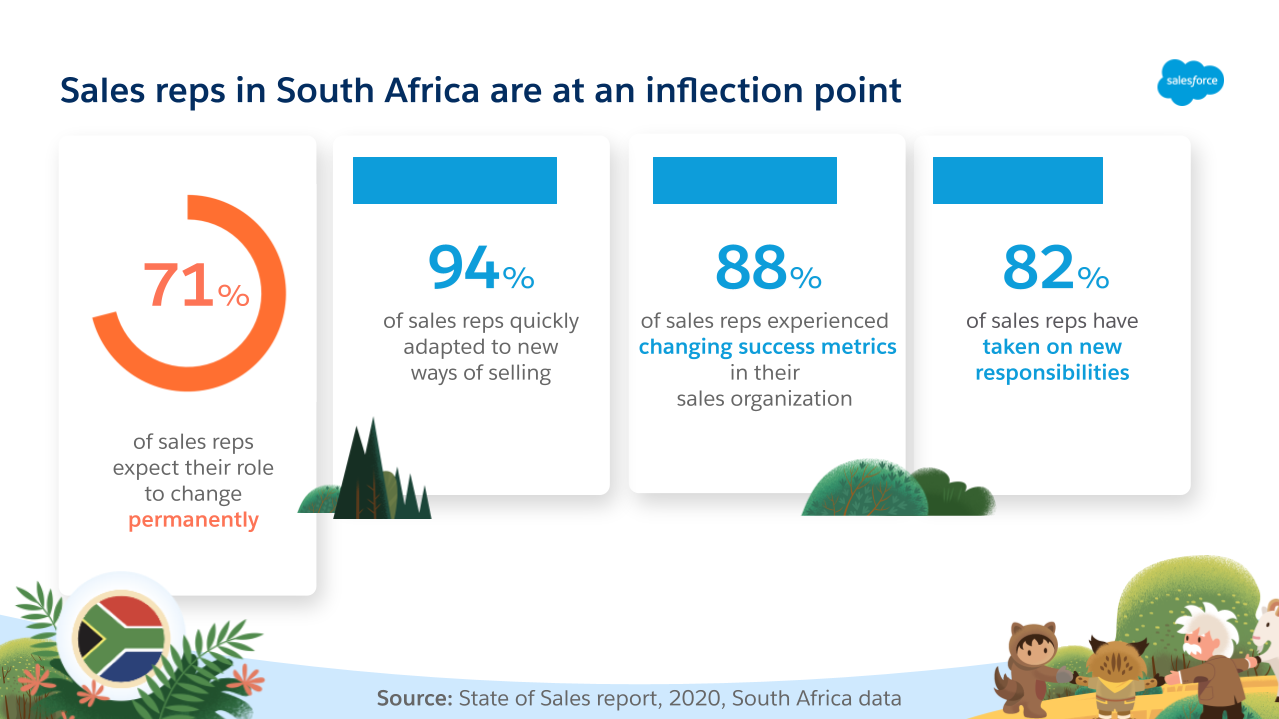
The face of sales in South Africa is changing. Find out how to thrive in the new normal
In business, ground-breaking events that shake up every department and force leaders to take a long, hard look at their processes are incredibly rare – and we’re talking global pandemic levels of rare.
While companies scrambled to mobilise their workforce and ensure business continuity during the COVID-19 crisis, some aspects of the old normal simply don’t fit with customer expectations now the dust has settled. Face-to-face selling, for example, is out. But with customers inundated with virtual meetings, time is a valuable asset, so building trust with your customers and acting with empathy are more important than ever.
So, what foundations do you need to have in place to empower your people to sell with empathy at scale? According to our global State of Sales report, more than 3,150 sales professionals in South Africa think the top trends are greater flexibility, better and more accessible data, and simplified sales processes.
With South African sales teams at the forefront of innovation in response to the challenges of the pandemic, let’s find out how our respondents overcame these challenges and what they think the future of sales looks like for the region.
Agility and flexibility are key to meeting customer demands
The rise of remote working has caused the boundaries of work and homelife to blur, which means customers expect your sales team to be more available – But having reps available 24/7 is not a realistic option for everybody, so building strong relationships with customers before a sale is vital – a point that 90% of sales professionals in South Africa agree on.
With Salesforce enhancing our processes, we’re able to work at the pace and standard that we need to in order to continue to grow and transform as a business
Marius Burger, CIO,
SEACOM
The starting point for this might not be what you think. It requires taking a step back and looking at the bigger picture of your business operations – 89% of respondents in South Africa commented that reps are increasingly recognising their value to the company’s core strategy and supporting growth and continuity. This presents an opportunity to really drill down into the skills across the sales team and bridge the gap between the sales experience and business operations to streamline collaboration.
Flexibility is key, with 82% of South African sales teams reporting that they’ve taken on new responsibilities at work during the pandemic. Clearly, good things are happening, because 66% expect these changes to be permanent.

Benchmarks have also shifted, with 84% citing that success metrics have changed, and this is where technology steps into the spotlight, because agile technology that adapts and changes with your business needs and provides real insights into KPIs is the best tool to safeguard business against uncertainty.
For the 80% of South African respondents who reported significant changes in how they use sales technology, not being able to accommodate the shift could have been disastrous. Dave Keefer, Business Development Manager at KBAC echoed a common sentiment in a recent blog: “We were concerned that leading a traditional workplace into the digital age would not be an easy task, but it’s hard to be agile when your processes are paper-based, and the door to digital that we opened led to some pretty remarkable places, especially in the wake of COVID-19.”
Insight selling, video conferencing, and other tech-intensive sales tactics have become increasingly valuable, along with AI and integrated CRM platforms that can help sales team work effectively from anywhere and reveal compelling insights based on real-time customer data to supercharge those video conferencing calls, as demonstrated by KBAC.
“We turned to Salesforce to make our operations more efficient and connect better with our customers. We used Sales Cloud to monitor our KPIs and qualify leads, and then customised it to automate processes for jobs and orders,” says Keefer. “Collaborating on Chatter has been revolutionary. We’re suddenly communicating a lot better, with teams chatting directly on the opportunity and account pages. When it was time to reach out to customers, access to real-time data helped them coordinate their efforts.”
Making richer data more accessible
Users across organisations are increasingly mining data from as many sources as possible to get 360-degree visibility of their customers, with the average set to increase from four in 2019 to six in 2021 in South Africa. For the sales team, a better understanding of the customer powers insight selling. And this isn’t something that’s ‘nice to have’; while being data-driven is a differentiator right now, with the speed of innovation it will soon become the new normal, so companies need to act now.
Centralising data on one platform can help to unlock this visibility and build a more connected customer experience, combining first-party data, with insights from social listening, and even tracking micro trends in the industry through the media. While 87% of South African B2B buyers expect businesses to have a good understanding of their needs, 62% think companies are failing to deliver here, making it an excellent opportunity to get an edge on the competition.
Also consider that all this data is only as good as your visualisation capabilities, which is where tools that can easily turn data from multiple sources into customisable dashboards are so valuable to help your reps get a deeper understanding of customer needs. Again, with 74% of South African respondents feeling that interactions are transactional, not personal, this in another area to really help differentiate your team – especially as 95% of customers expect your sales people to act as a trusted advisor.
AI solutions can take this a step further by analysing lead history to work out which new leads are most likely to convert and helping reps prioritise where they should spend their time. And the more data you put in, the more accurate the solution will get at predicting.
The end result is that you can automate manual processes and empower your team with the time and insights to give customers an engaging, personalised experience, whether that’s remotely or in-person as lockdown restrictions ease.
Simplifying complex processes
Using multiple tools is complex, but centralising processes and data on one integrated platform can be transformative. An advanced CRM platform can help free your team from data-logging and can manage the entire sales pipeline from opportunity to close. Learn what your sales team’s pain points are, and look for a feature-rich solution with capabilities that will have a real impact on their working day.
One South African Trailblazer who transformed sales is SEACOM. Shereen Rimmell, Head of Business Operations reveals: “Now that everything gets handled in Sales Cloud, we’re able to do our jobs much more effectively. The general feedback has been: ‘Wow, the Business Ops team are really on the ball now!’ That’s been huge.”
The implementation has boosted speed and efficiency, streamlined customer onboarding, and reduced manual input with more automated processes. CIO, Marius Burger, comments, “With Salesforce enhancing our processes, we’re able to work at the pace and standard that we need to in order to continue to grow and transform as a business.”
SEACOM’s success mirrors a general trend among South African reps: they have more confidence in their organisation’s ability to succeed than other regions. For example in South Africa:
- 74% have confidence in their ability to close deals
- 72% have confidence in the organisation’s agility
- 76% have confidence in the business’s long-term resiliency.
These figures are between 7-12% higher than global industry averages, and may be down to South Africa’s higher than average flexibility and adaptability. Service teams are considerably more likely to have taken on more responsibilities and changed their success metrics since the pandemic, and the region has a much bigger focus on building trust with customers before a sale, which are all key ingredients in resiliency.
Meeting customer demands in-store, in person and online
The picture in South Africa is optimistic, but confidence alone doesn’t drive success. It needs to be combined with the right technology, processes, and data to give customers the personalised, compassionate selling experience they expect in-store, in person, and virtually.
Smart solutions can free your team from manual work and empower them with the insights to have conversations that close deals, but investing in next-generation technologies like AI now will help to maximise the potential of data and unlock greater predictability – something that will continue to mature and get more intelligent the more data you feed into it.
Giving your customers what they want now is amazing. Giving them what they want before they realise they want it will blow the competition out of the water, and help to build the trust that will help your company grow – global pandemic or no global pandemic.
Take Sales Cloud for a spin with our interactive tour and find out how to transform your business with 360-degree visibility and smarter workflows.